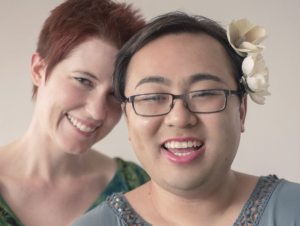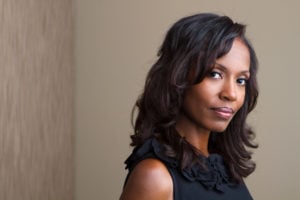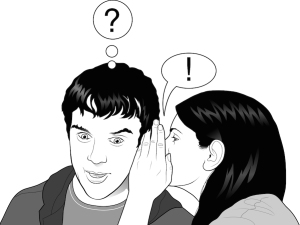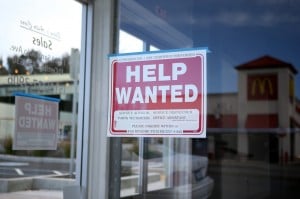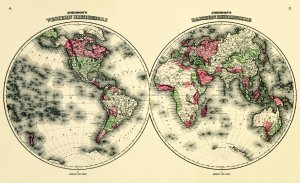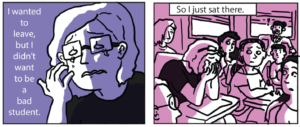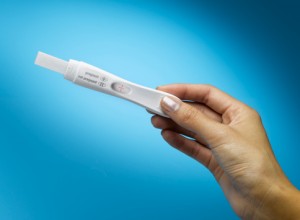
Source: Getty Images
You’ve seen the signs: “Pregnant? Scared? Alone? We Can Help.” Have you ever responded to one?
Thousands of women have.
Usually promising free services like pregnancy testing, ultrasounds, and “judgment-free” counseling, these centers reach out to women in potentially vulnerable positions, claiming to offer hope and help.
But what are they really like?
While they claim to offer comprehensive care, these religiously-affiliated centers in truth offer anything but. They’re called crisis pregnancy centers (CPCs) officially and by many others, fake clinics due to their staff being largely made up of volunteers, often from a nearby church, and not medical professionals.
The centers’ main intention is to keep people from obtaining abortions by deliberately misinforming them.
Common forms of deception utilized by CPCs include:
- Giving inaccurate information about how far along a woman is in her pregnancy, sometimes even giving women false negatives so as to delay her ability to obtain an abortion until its much riskier, more expensive, and/or altogether inaccessible
- Telling women that abortion is extremely painful and life-threatening with irreversible mental and physical health effects, including that it leads to an increased risk of breast cancer, sterility, and even suicide
- Showing women ultrasounds, often without their consent, as a way to guilt women into carrying their pregnancies. A CPC profiled in HBOs 12th and Delaware shows a clinic writing “Hi Mommy” on ultrasounds
- Presenting women with graphic and gruesome videos and pictures supposedly depicting abortions, telling them that they’re selfish if they choose abortion, and that abortion is murder
- Giving false information about emergency contraception and birth control, for example: that condoms do not protect against STIs and pregnancy. 24-year-old activist Katie Stacks recently went undercover at a CPC in Ohio, recording her conversation with a counselor, in which they told her that the morning-after pill was “like having kind of an abortion” and that it was dangerous to her health
- Setting themselves up near, or next to, abortion clinics and giving their centers names like “A Woman’s Choice,” “First Choice Women’s Health,” “Pregnancy Help Center,” and even “Unplanned Pregnancy” so as to confuse women seeking out medical care. It’s very common for women to accidentally walk into one when they really have an appointment at an actual clinic nearby.
According to a post on Reddit that went viral earlier this summer, many women walking into a CPC, called “A Woman’s Choice,” in Louisville, KY think they are entering the abortion clinic located just down the block.
This isn’t helped by the fact that, upon entering, they’re told that they are, in fact, at the abortion clinic, and then are taken to the back room for an ultrasound while being lectured on the “sins of abortion” and refusing to give women their clothes back until the women have listened to their entire speech.
The post reports that women often leave the building crying and, on occasion, without pants.
Anything to Keep Women from Having Abortions
Though many of these centers have been around for decades (they started popping up in the 1960s in response to states decriminalizing abortion), CPCs are rapidly increasing in number, with more than 4,000 now in the U.S, compared to less than 2,000 clinics offering abortion care.
And they’re growing in spaces near college campuses and in poor neighborhoods, intentionally targeting communities of young women, poor women, and women of color.
Anti-abortion groups have long targeted communities of color, and CPCs are no exception.
CareNet, the largest national network of CPCs, developed the “Underserved Outreach Initiative” which is “first seeking to serve the community with the highest abortion rate – African Americans,” saying its next step is to reach Latina women.
CPCs are increasingly targeting people with limited health insurance and neighborhoods that have no health care providers and services, establishing themselves often as the only space for people to go.
Targeting women of color is nothing new for the anti-abortion folks – campaigns calling abortion “Black Genocide” have been around for over a decade. You may remember the (over 60) billboards that went up in predominantly African American neighborhoods in Atlanta in 2010 stating “Black Children are an Endangered Species,” or the one in New York in 2011 proclaiming that “The Most Dangerous Place for an African American is in the Womb.”
They’re targeting college campuses as well, and more and more college health centers are (often unwittingly) referring students to them. Many students are organizing on their campuses to get their health centers to stop doing this and are speaking out to educate their peers on the truth behind these “clinics.”
And we’re paying for it.
According to the Sexuality Information and Education Counsel of the U.S. (SIECUS), CPCs have received more than $130 million in federal abstinence-only funding in 1982. And at least 20 U.S. states provide funding for CPCs.
In some states, women seeking abortions are actually required to go CPCs.
Seventeen states have passed mandatory consultation laws, in which women are required to be given counseling on either “the link” between abortion and breast cancer, the ability of a fetus to feel pain, or the long-term mental health effects.
Many of these are paired with extended waiting periods, and required counseling is often enforced when minors are granted a judicial bypass.
The problem isn’t that just these centers are offering a “different perspective” (albeit a shaming and potentially dangerous one), it’s that they’re intentionally lying to women under the guise of a comprehensive health clinic.
Optionline.org, a website listing and promoting CPCs throughout the country, claims that they offer “information on all your options and… can quickly connect you to the local assistance you need.”
They don’t call themselves pro-life and usually make no mention of their religious affiliation.
Women are entering these spaces hoping to receive factual information and referrals. Not only do they not receive these things, they’re often faced with a confusing array of ideas and facts, left to sort through which is which in what is already likely a very vulnerable time in their lives.
And this is something many activists are working to change.
In an effort to make sure that women are fully informed, people are working to pass Truth in Advertising laws on campuses, in cities, and states throughout the country.
Using NARAL Pro-Choice Maryland’s investigative report on the harm CPCs cause, Baltimore passed the first legislation in the nation requiring these centers to disclose that they neither refer for nor offer abortion services in 2010. Although initially the law was challenged by the Archdiocese of Baltimore, calling it unconstitutional, the judge recently upheld the decision.
Other cities, like Austin, New York, and San Francisco have followed suit, though have been not been able to keep the law in place due to continual court battles with CPCs claiming that deceiving women is within their First Amendment rights.
On a federal level, Rep. Carolyn Maloney (D-NY) sponsored the Stop Deceptive Advertising for Women’s Services (H.R.2030) bill in the U.S. House last May.
Maloney noted in a statement on the bill, “Deception has no place when a woman is seeking information about her health or a pregnancy. Women shouldn’t be deliberately misled or coerced when they seek legitimate medical services.” Senator Robert Menendez (D-NJ) has introduced a companion bill in the Senate.
There’s plenty of community action that needs to be done as well. This is an issue in which speaking out, and speaking the truth, will challenge their power.
People are finding creative ways to spread the word about what these centers really do – from holding speak-outs to creatively changing CPC signs, to spreading fliers proclaiming the truth about CPCs in their neighborhoods. If you’re in school, call your school health center to make sure they don’t refer students to a local CPC.
If there’s one in your neighborhood, hold a rally outside calling attention to it. Go undercover into the CPC to find out for yourself what they’re actually telling women and report back to your community.
Hold a public movie showing of HBO’s 12th and Delaware and have a discussion afterwards about what your community can do. Talk to your representative about passing a Truth in Advertising law in you area. Start a petition. Write letters to the editor.
And get the facts – NARAL and Planned Parenthood have more information on CPCs and the abortion laws by state.
Fake clinics will continue to deceive and hurt women if we do nothing. Our silence is their greatest weapon.
The most important thing that we can do to fight CPCs is to speak out.
By standing up and speaking truth to power, we can see that women don’t unwittingly enter CPC walls, that CPCs no longer spread lies, and that we build a community that stands up and fights for a world in which women have access to honest and comprehensive reproductive health care.
[do_widget id=”text-101″]
Laura is a feminist activist, social justice organizer, clinic escort, and yogi. After graduating from the University of Iowa with degrees in Gender Studies and Anthropology, she spent a year doing restorative justice and support work in Iowa’s women’s prison, then moved to Washington, D.C. to organize students around abortion access on their campuses and in their communities. Currently, she volunteers for HIPS, a kick-ass org that supports men, women, and trans* folks engaging in sex work in the D.C. area, coordinates the Washington Area Clinic Defense Task Force, and teaches yoga. Follow her on Twitter @Feminist_Oryx.
Search our 3000+ articles!
Read our articles about:
Our online racial justice training
Used by hundreds of universities, non-profits, and businesses.
Click to learn more












